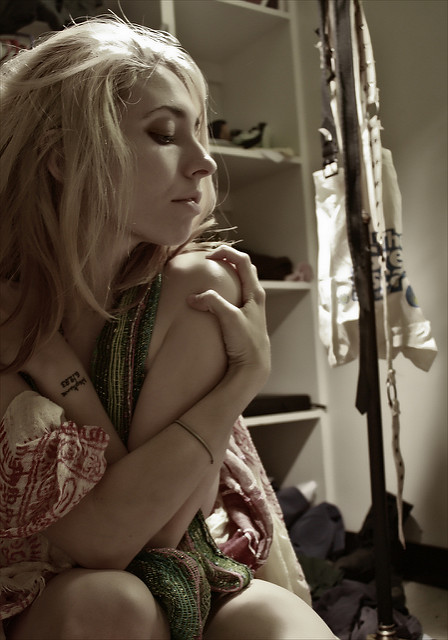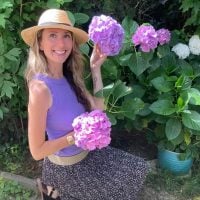
When we aren’t able to love ourselves enough, we sometimes enter relationships precisely to feel that we are “enough” and lovable.
If you are a bit insecure, as I have been, being in a couple brings you comfort and a sense of safety and worthiness that you probably couldn’t find on your own.
Instead of staying single until the “right match” presents itself, I have tended to start relationships because I needed to feel secure and worthy of being loved. Sometimes, I would start dating someone even if it didn’t feel properly right from the beginning.
This mostly happens for girls, I believe, that have lacked the presence of a fatherly figure—which is my case.
As I had not received the love and protection that I needed as a child, I wasn’t able as a young woman to find that sense of self-love and comfort on my own.
So I have tried to look for it on the outside. Also, as I didn’t really know who I wanted to be, I sometimes decided to team up with a man that could give me answers and lead the ride.
Unfortunately, our partners, and outside people as a whole, tend to show us their own ways of being in the world instead of the ones that we personally seek.
The clues they provide are their own, and not ours. They tend to pull us to their own expectations and life choices.
The partners that we chose in those cases do that unknowingly most of the time. They are not to blame, per se, as we are also responsible for being in the relationship. The truth is that we needed them, at least for a given period of time.
As I often like to say, I was sometimes fooled by myself.
I had oriented myself, for a large period of time, to make major life decisions around being able to maintain a relationship that I was in. Instead of trying to find balance on my own, I would decide to rest in my partners’ arms and find my way through them.
I would unconsciously believe that our love story would allow me to postpone or even to replace the self-discovery journey that I needed to go through.
Actually, it now seems that the little girl that I used to be—and that still lives within—was trying to find a man who could solve her own equations and provide the nurturing love that she had missed.
That figure would grant her that feeling of self-confidence which only our parents can truly provide. That sense of self-worth that we all need to find ourselves in an autonomous way as adults.
In other words, the “inner child” would have done anything to get the love that she had missed as a kid.
So, she was ready to give up on herself and on her own life expectations to keep a given relationship. She would agree to live in a given city which she didn’t like, to start that job which she intimately knew wasn’t for her, to live that specific kind of life.
As an adult, I would agree to almost anything because I needed to feel loved and protected. I would say yes even if the destination it seemed to take me to felt intimately dissonant.
This type of relationship could be described as a “dark exchange.” I would decide, somewhere in my heart, to give up on looking for my own way and on trying to make my findings tangible in the physical world.
I would abandon myself in relationships to feel that I was “enough.”
Unfortunately, or maybe fortunately, I have found out that this strategy can’t be a long-term solution.
Until we truly know who we want to be, there is no outside person that can give us all answers we seek. The only true and reliable findings about our own selves are the ones that come from within.
I remember many days when I felt deeply dissonant in a relationship. I felt that our choices together were taking me away from the life that I wanted.
That wasn’t my partner’s fault. I could have expressed myself more or even decided to move on without him.
But I didn’t feel strong enough to stand on my own two feet. I was trapped because I would refuse to acknowledge the fears, doubts, and deep feelings of insecurity coming from the little girl within.
Most of the time, the partners that we choose are actually mirroring our personal issues and the needs that we can’t feed on our own.
Until we properly commit to the exercise of self-understanding, until we have chosen the path of embracing our real fears and shadows, we tend to unknowingly seek on the outside what we can’t find within.
I have learned the hard way that there is no shortcut to our own fulfillment.
On the opposite end of the spectrum, when we decide to consider our own issues around love, which could be found by asking the questions, “What am I really seeking in a couple?” or, “Why am I giving love to that specific kind of man?” or, “Am I choosing that person to fill something that is missing within myself?”
And most importantly, “What am I expecting in return for my love?”
We open a box of truth that is key to long-term fulfillment in relationships.
Answering these questions requires a lot of inner work, self-compassion and self-understanding.
The truth can be disruptive. But it may be the first step to find the “right” partner for us. Someone that we will really love for who he or she is, and not just for what he or she could bring.
Someone that doesn’t come to rescue us, but someone we can be with because we share similar visions for life and expectations for a common future. I have found out that the relationships that start from a “save me” place most often don’t have a fairy tale ending.
Working on our own shadows and issues around love should be the first step before we get truly involved with anyone.
The other side of the coin lies in the willingness to be patient and to accept the status and aloneness of being “single.” But most often, the best prizes are worth the wait.
One day, we see that we have understood enough of ourselves to start a relationship from solid foundations or from what we could name “a place of wholeness.”
That kind of well-grounded relationship will enable each partner to grow, both together and separately, both hand in hand and on parallel paths—instead of being slowly drifted away from their own identity.
~
Author: Sophie Gregoire
Image: Flickr/Mysi
Editor: Travis May

 Share on bsky
Share on bsky





Read 23 comments and reply